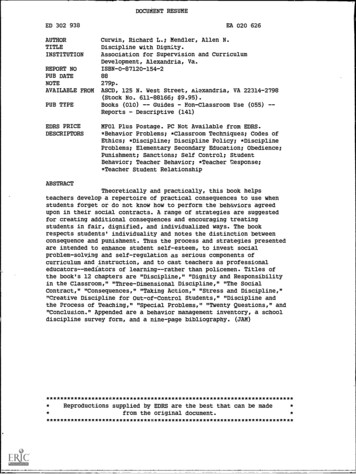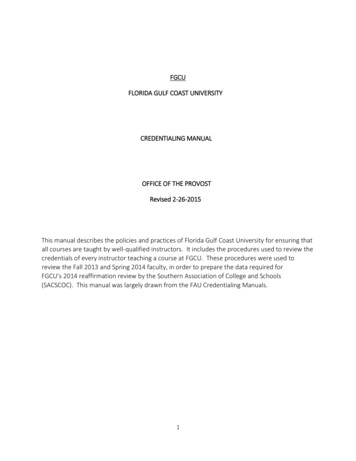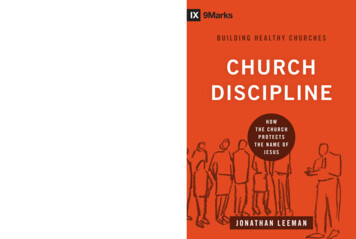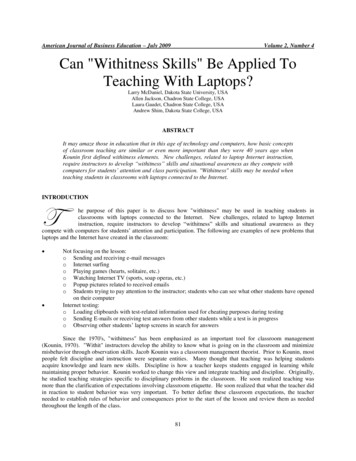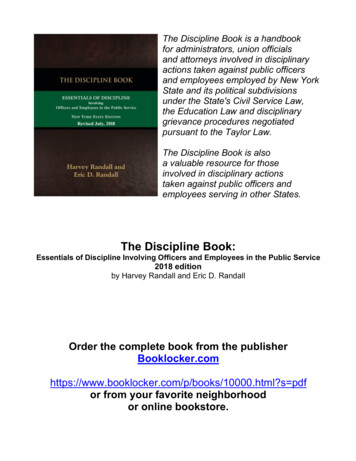
Transcription
The Discipline Book is a handbookfor administrators, union officialsand attorneys involved in disciplinaryactions taken against public officersand employees employed by New YorkState and its political subdivisionsunder the State's Civil Service Law,the Education Law and disciplinarygrievance procedures negotiatedpursuant to the Taylor Law.The Discipline Book is alsoa valuable resource for thoseinvolved in disciplinary actionstaken against public officers andemployees serving in other States.The Discipline Book:Essentials of Discipline Involving Officers and Employees in the Public Service2018 editionby Harvey Randall and Eric D. RandallOrder the complete book from the p/books/10000.html?s pdfor from your favorite neighborhoodor online bookstore.
Copyright 2018 Public Employment Law PressISBN: 978-1-87867-340-4All rights reserved. No part of this publication may be reproduced, stored in a retrieval system, or transmitted inany form or by any means, electronic, mechanical, or otherwise, without the prior written permission of theauthor.Published by BookLocker.com, Inc., St. Petersburg, Florida.BookLocker.com, Inc.20182018 Edition
USING THIS DATABASEThis is a "searchable" database and users may search for material contained in this databaseby using a key word, phrase, citation or other "identifiers"to locate relevant data included in this database, e.g.:DickinsonMoriah Central School District82 AD2d 960qualified immunityFootnotes are identified in the text by with a red "super-script" numeral. For example, xxx126.The material in this database has been set out in a number of "general" subject matter headings, e.g.:
Table of ContentsSECTION 1 - INTRODUCTION . 1SECTION 2 - DUE PROCESS RIGHTS OF EMPLOYEES . 16SECTION 3 - CONDUCTING AN INVESTIGATION . 78SECTION 4 - EVIDENCE . 102SECTION 5 - NEGOTIATED DISCIPLINARY PROCEDURES . 120SECTION 6 - FILING CHARGES PURSUANT TO §75 . 135SECTION 7 - FILING CHARGES PURSUANT TO §3020-A. 145SECTION 8 - SUSPENDING EMPLOYEES PENDING A HEARING . 169SECTION 9 - PENDING CRIMINAL ACTIONS . 185SECTION 10 - PREPARING FOR A HEARING. 191SECTION 11 - PROPOSING A PENALTY . 208SECTION 12 - APPEALS . 241SECTION 13 - NON-DISCIPLINARY TERMINATIONS . 256SECTION 14 - TERMINATIONS WITHOUT A HEARING . 275SECTION 15 - REDRESS AND REMEDIES. 294SECTION 16 - DRUGS, DRUG TESTING AND DISCIPLINE . 300SECTION 17 - SOME SPECIAL PROVISIONS OF LAW . 311SECTION 18 - PROVISIONAL AND PROBATIONARY EMPLOYEES . 321SECTION 19 - SELECTED CASE REFERENCES . 354SECTION 20 - AMENDMENTS TO §3020-A THE EDUCATION LAW . 416SECTION 21 - SELECTED COURT DECISIONS. 419SECTION 22 - EFFORTS TO REMOVE A MEMBER OF A SCHOOL BOARD FROM OFFICE . 658ABOUT THE AUTHORS . 677iv
SECTION 2 - DUE PROCESS RIGHTS OF EMPLOYEESWhen courts review the lawfulness of disciplinary actions taken against public employees, a single question isthe most fundamental: Did the employee involved receive all the administrative due process to which he or shewas entitled in the course of the disciplinary process?Courts view the failure to satisfy any one of the elements required for administrative due process as a completefailure of the process and this will result in the complete frustration of the appointing authority’s effort todiscipline an officer or an employee.The vesting of the responsibilities of being an appointing authority is derived from local or state legislation, orthe charter of a locality. For example, the appointing authority for a Sheriff’s Department is typically the sheriff.In political subdivisions of the State the appointing authority may be the school board, the governing body of apublic authority, a town board, the town supervisor or the mayor. With respect to the State as an employer, theappointing authority is usually the agency or department head. In this database, the terms “appointing authority”and “employer” will be used interchangeably.When courts uncover an error in due process that it does not view as “harmless error,” they will voiddisciplinary penalties and either dismiss the case or remand (return) the case to the employer forreconsideration. Ignoring due process is costly -- and unfair.Due process is short for “due process of law.” This is an old concept with roots in English common lawtraditions. Under the common law individuals could not be deprived of their liberty without due process of law - notice of the charges and a full and fair hearing before any action could be taken. Freedom from arbitraryaction was deemed a form of liberty that must be protected. Over time the concept of liberty was extended tocover property rights. Clearly, a farmer evicted from his property without just cause was denied liberty. In the16th century, the common law recognized that one’s job is a form of property and that keeping one’s job is aform of liberty. Under the common law, any person “put from his livelihood” had been denied liberty. Hence, noman could be denied his employment or trade without due process of law.In modern disciplinary actions, it is essential that employees’ due process rights be respected. Employees whoare entitled to due process (typically, “permanent” and “tenured” employees) cannot be removed or subjected toany disciplinary penalty unless their incompetence or misconduct has been proved by substantial evidencepresented in an administrative hearing.Like the criminal justice system, administrative disciplinary procedures incorporate fundamental due processconcepts such as the presumption of innocence of the accused and the placing of the burden of proof on thecharging party.§75 of New York’s Civil Service Law, for example, requires notice and hearing, the right to representation, theright to confront and present witnesses, and the right of review or appeal.This right to cross-examine witnesses was demonstrated in Barber v New York State Off. of Victim Services,103 AD3d 931, wherein the court ruled that providing an opportunity to cross-examination witnesses is acritical element to due process in quasi-judicial administrative proceedings.16
The Discipline Book - New York State Edition - Revised July, 2018Barber had installed certain security and surveillance devices after being subjected to alleged stalking andharassment she claimed that she had experienced. She then filed a request for reimbursement for the cost ofsuch devices with the State’s Office of Victim Services, which application was rejected on the ground that shefailed to prove that a crime had been committed.Barber appealed and a hearing was conducted by a three-member panel of the Office of Victim Services. Thepanel affirmed the disallowance of Barber‘s claim.In response to Barber’s challenging the panel’s determination, the Appellate Division said that notwithstandingthe substantial evidence in the record to support Victim Service’s denial of Barber’s claim, reversal of theadministrative determination was required because Barber had not provided with an opportunity to crossexamine witnesses providing testimony at the hearing.According to the decision, although the panel was advised that Barber was waiting in the lobby for the hearingto begin, the panel members conducting the hearing and made the affirmative decision to take the testimonyfrom one of the witnesses without her being present. Further, Barber was only invited to attend the hearingfollowing the conclusion of that witness's testimony and then was asked to leave the hearing after testifying.Then, said the court, testimony was taken from a second witness without Barber being present.The Appellate Division ruled that as Barber had been denied the right to cross-examine witnesses, the panel’sdetermination must be annulled and the matter remitted to Victim Services for a new hearing.The court explained that "Regardless of the merits in a particular case, a party whose rights are beingdetermined at a quasi-judicial administrative hearing must be given the opportunity to cross-examinewitnesses," citing Matter of Seeger v Moduform, Inc., 146 AD2d at 923.What if the witness is a child? This question was addressed by the Appellate Division in Stergiou v New YorkCity Dept. of Educ., 106 AD3d 511.Here a teacher appealed the Supreme Court’s denial of her petition to vacate the adverse disciplinary arbitrator’saward and its granting the employer’s motion to confirm the award. The critical issue before the AppellateDivision: was the teacher denied administrative due process when she was not permitted to be present duringthe testimony of the “complaining witness,” a student?The Appellate Division unanimously reversed the Supreme Court’s ruling “on the law” and remanded the matterto the hearing officer with instruction that the hearing officer take testimony from the child complaining witnessin the presence of the teacher.The Appellate Division, citing Matter of Daniel Aaron D., 49 NY2d 788, explained that the teacher's exclusionfrom the administrative hearing “during the testimony of the only eyewitness to her alleged hitting of a student— the student himself — violated her constitutional right to confront the witnesses against her.”The court said that nothing in the record indicated that there was a “compelling competing interest” thatwarranted the teacher being excluded from that portion of the hearing and the record was silent as to the basisfor the teacher’s exclusion.17
Essentials of Discipline Involving Officers and Employees in the Public Service - An Electronic DatabaseFurther, the Appellate Division noted that there was no finding that teacher's presence would cause trauma tothe student or substantially interfere with his ability to testify.With respect to another argument advanced by the teacher -- in addition to her constitutional right she had anabsolute right to confront witnesses under Education Law §3020-a – the Appellate Division ruled that “shewaived that argument by failing to object on the record to her exclusion from the hearing, but had she soobjected the argument would have been rejected” as the Appellate Division observed that “In any event, there isno such absolute right under §3020-a.”Similar due process requirements are essential in alternative dispute resolution procedures negotiated throughcollective bargaining in accordance with the New York State Taylor Law.Contract disciplinary procedures typically cover only those employees who have rights under statutes such as§75 of the Civil Service Law or §3020-a of the Education Law. However, some collective bargainingagreements grant due process rights to certain groups of employees, such as provisional employees, who are notprovided with such rights by statute.Due process rights depend on appointment status and jurisdictional classificationThe right to due process is not universal. For example, a substitute teacher employed for a two-week stint doesnot have the same right to due process as a tenured teacher. Likewise, a provisional civilian police dispatcherdoes not have the same right to due process as a detective holding a permanent appointment. It should be clearfrom these examples that the due process rights of an individual employee flow from that individual’sappointment status and jurisdictional classification.Appointment status, also known as employment status, refers to whether one holds permanent, contingentpermanent, temporary, or provisional appointment. The appointment status of employees in the public service isconsidered in “The Concept of Tenure” [See below].The term jurisdictional classification refers to whether a position is (a) in the classified service, and thereforesubject to the jurisdiction of a Civil Service Commission or (b) in the unclassified service [§35, Civil ServiceLaw], and therefore not subject to the jurisdiction of a Civil Service Commission. The term jurisdictionalclassification is sometimes confused with “position classification.” Position classification deals with the dutiesand responsibilities of a position and, for State positions, its allocation to a salary grade. See below, “Budgetaryclassification is irrelevant to due process rights of employees.”“Jurisdictional classification” also refers to whether a given position in the classified service is assigned to thecompetitive, non-competitive, exempt or labor class [§2.10 of the Civil Service Law]. Unless placed in adifferent jurisdictional class by action of a civil service commission or by statute, all classified service positionsare in the competitive class.33 The term "jurisdictional classification" means the assignment of positions in the classified service to the competitive, noncompetitive, exempt or labor classes. In contrast, the term "position classification" means a grouping together, under common anddescriptive titles, of positions that are substantially similar in the essential character and scope of their duties and responsibilities andin the qualification requirements therefor.18
The Discipline Book - New York State Edition - Revised July, 2018Issues of appointment status and jurisdictional classification are at the heart of a high percentage of lawsuitsinvolving disciplinary cases. Anyone involved in the disciplinary process should look at these issues first, as anemployee’s due process rights depend on his or her actual, i.e., statutory appointment status and the actualjurisdictional classification of the position to which he or she has been appointed.We use the word “actual” because the failure of an employer to properly identify an employee’s statutoryappointment status or the statutory jurisdictional classification of the individual’s position does not expand ordiminish the employee’s legal rights.Probationers terminated during the probationary period often claim they were denied due process and constituteanother significant body of individuals filing lawsuits against public employers in New York State.For probationers, one other factor influences the right to due process beyond those listed above: how long theprobationer has served in his or her position. Employees in competitive class or the non-competitive class whoare serving probationary periods have due process rights only if they (a) not yet completed the minimum periodof probation, (b) have become “tenured” by successfully completing their probationary period, or (c) havebecome tenured by serving the maximum period of probation and continuing to work in the position withouthaving been removed by the appointing authority. Being continued in service beyond the maximum period ofservice without the appointing authority having taken formal action to confirm or deny tenure in the position isreferred to as attaining “tenure by estoppel” or sometimes as attaining “tenure by acquiescence”. In fact, §65.4of the Civil Service Law actually provides for an appointee attaining tenure by estoppel under certaincircumstances.In contrast, probationers may be dismissed without due process, i.e., notice and hearing, for any lawful reasonor for no reason, if they have completed their minimum period of probation but have not yet completed theirmaximum period of probation. See below, “The concept of tenure,” and the successive sections.In any event, neither a department policy nor a term in a collective bargaining agreement may trump theprobationary period established by law or a rule or regulations having the force and effect of law as the decisionin Yan Ping Xu v New York City Dept. of Health & Mental Hygiene, 121 AD3d 559, demonstrates. See, forexample, City of Plattsburgh v Local 788, 108 AD2d 1045. Case law indicates that seniority for the purposes oflayoff can neither be diminished nor impaired by the terms of collective bargaining agreements, i.e. layoffswithin the title can only be made in inverse order of civil service seniority consistent with the mandates of CivilService Law §80(1) and not by any other method.Here the court found Yan Ping Xu was subject to a probationary term of six months notwithstanding any alleged“department policy” or provision in a collective bargaining agreement to the contrary and upon the expiration ofthat six-month period she became a “tenured employee” and could only be terminated after notice and hearingand remanded the matter to the New York City Dept. of Health & Mental Hygiene “for further consideration of[Yan Ping Xu’s] claim of unlawful termination.”In its decision the court said that Yan Ping Xu became a “permanent” employee. However, an employee servinga probationary period is a permanent employee and attains tenure in the title upon his or her successfulcompletion of the probationary period. Civil Service Law §63.1, in pertinent part, provides that a “ municipalcivil service commissions may provide, by rule, for probationary service upon appointment to positions in19
Essentials of Discipline Involving Officers and Employees in the Public Service - An Electronic Databasethe exempt, non-competitive or labor classes .” and “shall, subject to the provisions of this section, provide byrule for the conditions and extent of probationary service” [see Civil Service Law §63.2].The categories of jurisdictional classification in the classified service are the competitive class, non-competitiveclass, exempt class and labor class. One might wonder why these different classes exist.The answer lies in Article V, §6 of the New York State Constitution, which requires that, wherever practicable,appointments and promotions in the civil service be made according to merit and fitness. Competitiveexaminations are used to establish eligibility for such employment. Because competitive examinations are notpracticable in every instance, the State Legislature provides guidelines for creating positions outside thecompetitive class. These positions may be placed in one of three categories: the exempt class, the noncompetitive class or the labor class.“Jurisdictional classification” refers to the decision-making process concerning whether a position belongs inthe competitive class or one of the other classes listed above.In February 1998 the Civil Service Commission proposed a rule to clarify the categories outside the competitiveclass by establishing these definitions:Exempt class: “The exempt class is to include those positions specifically placed there by the Legislature,together with all subordinate positions for which there is no requirement that the person appointed pass a civilservice examination. Instead, appointments rest in the discretion of the person who, by law, has determined theposition’s qualifications and whether the persons to be appointed possess those qualifications.”Non-competitive class: “The non-competitive class is to be comprised of those positions which are not in theexempt or labor classes and for which the Civil Service Commission has found it impracticable to determine anapplicant’s merit and fitness through a competitive examination. The qualifications of those candidates selectedare to be determined by an examination which is sufficient to insure (sic) selection of proper and competentemployees.”However, as the Appellate Division indicated in Bruen v Lhota, 114 AD3d 676, employees in a non-competitiveposition designated as confidential or policy-influencing are not within the ambit of Civil Service Law §75.A former employee [Petitioner] of the New York City Transit Authority [NYCTA] filed an Article 78 actionchallenging [1] NYCTA terminating him without a formal hearing pursuant to Civil Service Law §75 and [2]rejecting of his request for a lump sum payment for unused leave “based on his election to retire in response toan investigation into certain timekeeping violations which he subsequently was found to have committed.”Supreme Court, Kings County dismissed the Article 78 proceeding and the Appellate Division affirmed thelower court’s ruling.Addressing Petitioner’s claim that he was denied due process as a result of NYCTA’s failing to provide himwith a pre-termination disciplinary hearing, the Appellate Division explained that NYCTA had demonstratedthat Petitioner was an employee to whom the provisions of Civil Service Law §75 did not apply as he wasemployed in a non-competitive class position that had been designated as confidential or policy-influencing.20
The Discipline Book - New York State Edition - Revised July, 2018§75 applies to certain persons holding permanent appointment in the Classified Service and, in pertinent part,provides that a person holding a position by permanent appointment in the non-competitive class of theclassified civil service in “other than a position designated in the rules of the state or municipal civil servicecommission as confidential or requiring the performance of functions influencing policy.” (See §75.l[c]).Turning to Petitioner’s claim that NYSTA could not deny his request for a lump sum payment without firstaffording him a formal disciplinary hearing pursuant to Civil Service Law §75, the Appellate Division ruled thatthe Authority’s action “was not improper.” See 4 NYCRR 23.1, which applies to employees of the State as theemployer and provides for payment of leave accruals upon separation. 4 NYCRR 23.1, in pertinent part,provides that “No employee who is removed from State service as a result of disciplinary action or who resignsafter charges of incompetency or misconduct have been served upon him shall be entitled to compensation forvacation credits under the provisions of this Part.” Many local civil service commissions have adopted a similarrule.Citing Pell v Board of Educ. of Union Free School Dist. No. 1 of Towns of Scarsdale & Mamaroneck,Westchester County, 34 NY2d 222, the Appellate Division dismissed this branch of Petitioner’s appeal notingthat NYCTA's determination denying Petitioner's request for a lump sum payment for his unused vacationcredits was in accordance with its established policy and was neither arbitrary and capricious nor sodisproportionate to the offense as to be shocking to one's sense of fairness.The labor class: “The labor class is to be made up of unskilled laborers in the service of the State and its civildivisions, except those which can be examined for competitively.” [NYS Register, Feb. 4, 1998, p.6]Entitlement to due processBroadly, the employees entitled to due process are those employees who are specifically granted due processrights under a state statute such as §75 of the Civil Service Law or §3020-a of the Education Law or a contractnegotiated in accordance with the Taylor Law.Most Taylor Law agreements closely track, or incorporate by reference, either §75 or §3020-a regardingcategories of employees entitled to due process.Those employees who enjoy a statutory right to due process under §75 or §3020-a are:1. Tenured teachers in the public schools and BOCES [§3020-a of the Education Law]; see “Due process rightsunder §3020-a,” below.2. Tenured administrators in the public schools and BOCES [§3020-a of the Education Law]; see “Due processrights under §3020-a,” below.3. Employees with permanent and “contingent permanent” appointments to positions in the competitive class ofthe classified service, provided they have either (a) not yet completed the minimum period of probation, (b)become tenured by successfully completing their probationary period, or (c) become tenured by serving themaximum period of probation and continuing to work in the position without having been removed by theappointing authority (“tenure by estoppel”) [§75.1(a) of the Civil Service Law].21
Essentials of Discipline Involving Officers and Employees in the Public Service - An Electronic DatabaseA so-called §64.4 or “contingent permanent” employee serves in a position that has been “left temporarilyvacant by the leave of absence of the permanent incumbent thereof,” and who has been permanently appointedor reinstated to the position in accordance with §64.4 of the Civil Service Law. For an example of how theseappointments are made at the state level, see §4.11 of the Rules of the NYS Civil Service Commission.4. Non-competitive class employees who have served for at least five years and who are not considered policymakers or “confidential” under the rules of the state or a local civil service commission. However, employeesdesignated “confidential” within the meaning of the Taylor Law [Civil Service Law Article 14] by PERBconstitute a different class of employees and such a designation does not affect their due process rights under§75, §3020-a and other statutes.If a probationary period is provided by the civil service commission having jurisdiction, non-competitive classemployees have due process rights only if they have either (a) not yet served the minimum period of probation,(b) successfully completed their probationary period, or (c) served the maximum period of probation and arestill working in the position without being removed by the appointing authority (“tenure by estoppel”)[§75.1(c)].5. Exempt class employees who are honorably discharged veterans who have served in time of war (WWI,WWII), or in a “police action”: Korea, Vietnam, Lebanon, Grenada, Panama or the Persian Gulf; [see §85] orare exempt volunteer firefighters as defined in the New York General Municipal Law §200 [§75.1(b) of theCivil Service Law].However, being a veteran or firefighter will not entitle an exempt class employee to due process if he or she isdesignated a private secretary, cashier or deputy of any official or department [§75.1(b)].Further, the presence (or absence) of the word “deputy” in an employee’s job title, such as deputy sheriff ordeputy commissioner, is not predictive of whether or not the person is a deputy under §75. The meaning of theterm “deputy” for the purposes of §75.1(b) refers to the possession of sufficient administrative power, by statuteor other authority, to perform duties vested in a principal officer [See Sullivan v Superintendent of Insurance ofNew York State (64 NY2d 1074)].To further complicate matters, courts have frequently relied on the duties set out in job descriptions rather thanduties actually performed to determine whether individuals are have “deputy” status.6. Labor class employees who are honorably discharged war veterans or exempt volunteer firefighters[§75.1(b)].7. Employees in New York City who have served for at least three years as Homemakers or Home Aides in thenon-competitive class [§75.1(d)].8. Police officers who have served as detectives for three continuous years, unless they are reduced in rank forsolely economic reasons, or consolidation or abolishment of police functions [§75.1(e)]’22
The Discipline Book - New York State Edition - Revised July, 2018Employees lacking due process rights.Entitlement to due process depends on whether statute or terms set out in a collective bargaining agreementcontrol.§75 does not grant due process rights to employees in the classified service who are:Temporary employees.Provisional employees.Non-competitive class employees who are policy-makers and are designated “confidential” in the rules of theresponsible civil service commission.Exempt class employees other than exempt volunteer firefighters and certain veterans.Labor class employees other
The Discipline Book is a handbook for administrators, union officials and attorneys involved in disciplinary actions taken against public officers and employees employed by New York State and its political subdivisions under the State's Civil Service Law, the Educa


